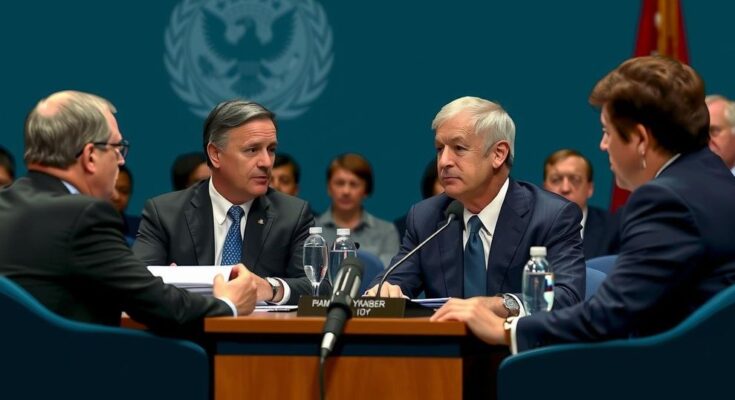At COP29 in Baku, negotiators finalized a contentious climate finance deal after sleepless nights of negotiation. President Mukhtar Babayev announced a $300 billion annual package for vulnerable nations, prompting immediate criticism from multiple countries. The conference was marked by a backdrop of escalating climate emergencies and diplomatic tensions, particularly regarding the role of wealthier nations in climate action.
Following extensive discussions marked by tension and urgency, negotiators at the COP29 climate conference in Baku finally struck a contentious agreement on climate finance after enduring three sleepless nights. President Mukhtar Babayev announced the adoption of a $300 billion annual funding package aimed at supporting vulnerable nations, only to face immediate backlash from various countries, including India and Cuba, who deemed the amount insufficient and criticized the decision-making process. The conference, held in a transformed Olympic venue, witnessed intense advocacy and dissent as delegates voiced their frustrations with the outcome. Azerbaijan’s leadership received criticism not only for its approach to the negotiations but also for its human rights record, with President Ilham Aliyev openly confronting Western nations during the opening remarks. Despite the contentious atmosphere, Babayev celebrated the agreement, declaring it a significant achievement despite skepticism surrounding Azerbaijan’s capacity to mediate effectively amid global climate challenges.
The COP29 climate conference unfolded against the backdrop of escalating climate crises, with 2023 anticipated to be the hottest year on record. As world leaders convened to address climate finance, expectations heightened regarding contributions from wealthy nations to support those most affected by climate change. The venue, a repurposed Olympic stadium in Azerbaijan, set the stage for high-stakes dialogues amongst diplomats, environmental advocates, and climate scientists. Previous summits have highlighted systemic tensions between developed and developing nations regarding fair funding and responsibility for emissions reduction, making this summit particularly pivotal in addressing those disparities.
In conclusion, the COP29 climate conference in Azerbaijan concluded with a contentious financial agreement aimed at supporting poorer nations besieged by climate change. Yet, the swift adoption of the deal sparked significant outcry from multiple nations, who felt the financial commitments fell drastically short of the urgent needs posed by the climate crisis. The circumstances surrounding the negotiations spotlight the ongoing divisions within international climate politics and the pressing need for equitable solutions.
Original Source: www.rfi.fr




